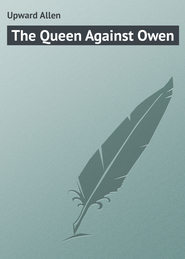По всем вопросам обращайтесь на: info@litportal.ru
(©) 2003-2024.
✖
Athelstane Ford
Настройки чтения
Размер шрифта
Высота строк
Поля
But as he stepped over the middle seat it chanced that he struck his foot against one of the oars which lay along the boat’s bottom; and the rattling of this oar put a new thought into my mind.
It so happened that I had been used to play with the quarterstaff at home, and old Sugden, the rat-catcher, who was esteemed the greatest proficient in this sort of exercise in our part of the country, had had many a bout with me, in which, before I ran away, he had been forced to confess that I was very well able to cope with him. Now, therefore, in my extremity, seeing death so near at hand – for up to this moment I had hardly believed that my cousin would kill me – I made shift to snatch at an oar, and drawing it to me just in time put myself in a posture of defence before he could strike me.
He drew back, greatly astounded, and swore beneath his breath.
“What fool’s game is this, boy? Would you break honour with me? We were agreed to fight with cutlasses.”
“And now that my cutlass is broke foully you would take and murder me!” I retorted, and being now incensed at his bloodthirstiness, after I had once spared his life, I cursed him in the face for a coward.
This was more than he could bear. He leaped across the seat, with his head stooped, to come inside the sweep of my weapon, but this was a trick I had had experience of, and though I found my oar very heavy and cumbrous I yet managed to repulse him with a crack on the head. And immediately he raised his cutlass to strike back I caught him a very smart blow on the knuckles, and sent his weapon flying over the side of the boat into the water, where it instantly sank.
By this time I think we were both too furious to be willing to end the combat without one or the other’s death. Rupert, as soon as he knew what had happened, fairly sprang upon me, and clutched my throat, bearing me down with him into the boat. Here he knelt above me, squeezing my windpipe, and emitting horrid snarls like a wild beast. My senses began to forsake me, and I was as good as lost, when, by the direct mercy of Providence, my right hand encountered the blade of my own cutlass, lying close beside us, which I instantly snatched at, and plunged as hard as I could thrust into Rupert’s side. And with that, feeling his fingers relax themselves as he tottered sideways from off me, I raised myself half up, lifted him by the thighs, and cast him clean over the side of the boat into the sea. And that done I sank down again in a bloody swoon, and perceived nothing more.
It was, as I learned, above a week afterwards when I fully came to myself, and discovered that I was lying in my former garret at the “Three-decker.” There was an old woman coming into the room to wait upon me, who told me that I had been brought ashore on the night of the duel by men wearing masks; and one of them, whom she knew by his voice and carriage to be the boatswain of the Fair Maid, had given money out of his pocket for me to be taken care of till such time as I should recover.
In the state of weakness to which I was reduced I shed tears at hearing of this kindness on the part of that rough man, who was, I sadly feared, a great scoundrel, of most villainous evil life. My next business was to ask what had become of him and the rest of the Fair Maid’s crew.
“The Fair Maid sailed yesterday,” the crone answered. “They warped her out on the afternoon ebb. ’Tis said she sails under a privateer’s commission against the French.”
I scarce knew whether to be glad of this news, or sorry. I told myself that I could hardly have looked for a welcome among those men after being the means of their lieutenant’s death; and, moreover, I had learnt enough of their character to feel strongly averse to a cruise in such company. Yet they were the only friends I had, and I was grown used to them; and the thought that I was left there, as it were, alone, with nothing to turn to, made me very dismal after all.
It seemed somewhat strange to me, during the rest of that day, that Marian had never once come to inquire for me; but I put off speaking about it to the morrow. In the morning I awoke greatly refreshed, and feeling well enough to leave my bed, which I did, and came down into the bar of the house to look for her.
I found only her uncle, a weazened, peevish man, who had showed himself very little while the privateersmen were about his house. I bade him a courteous good morrow.
“Good morrow t’ye,” he snapped out churlishly. “I’m glad to see you’re about again, as I daresay you know your reckoning has run out.”
This I did not believe, but thought it beneath me to pick a quarrel with such a man. Besides, he was Marian’s uncle.
“Any charges you may have against me shall be fairly met,” I answered proudly. “But where is Mistress Marian? I have not seen her these two days.”
“And you’re not like to see her again, I take it,” he returned disagreeably. “At least, not in my house; I’ve had enough of the impudent baggage.”
“What are you saying, man?” I demanded, much dismayed. “You need not miscall your own niece, I should think. But what of her? Do you mean she has left you?”
“Aye, what else should I mean? And right glad I am to be rid of such a trollop, drawing all the rapscallions of the port in here, and bringing my tavern into disrepute.”
He spoke so bitterly that I believe he was trying to talk himself into thinking he had profited by her departure. For in reality she had brought him the chief part of his custom, and there was at that moment, as I could perceive, not a soul in the tavern beside ourselves. But I did not stop to reflect on this.
“Where has she gone? What has happened?” I questioned breathlessly, with a terrible fear in my heart.
“Nay, whither she has gone is more than I can tell you, for as likely as not the jade has lied to me. But she left this place two days ago, in the afternoon, and all the account she gave me was that she had taken her passage in the Fair Maid for her father’s house in Calcutta.”
I fell down on a bench, like a man stunned, and groaned aloud. Then I sprang to my feet again and made for the door.
“I will follow her!” I cried out madly. “If she has gone to the end of the world I will go after her, and all the devils in hell shall not hold me back!”
And leaving the man there, staring at me as if he thought I was crazed, I ran out of the house, and so stumbled right into the arms of a pressgang come ashore off a king’s ship which had that morning dropped anchor in Yarmouth Roads.
CHAPTER V
ON BOARD THE KING’S SHIP
The license of these pressgangs was so well known, and had been made familiar to me by so many tales, that I had little hope from the first of escaping their clutches. It is true they were only authorised to impress seamen and fishermen, and that after proving their commission before justices of the peace. But if report did not belie them, they looked not too closely into a man’s seamanship; but, if they found a likely fellow, regarded all as fish which came into their net.
There was a lieutenant set above the fellows into whose hands I had fallen, a tall, lantern-jawed, middle-aged man, with a most abominable squint, and to him I addressed myself:
“Sir, I am not in a condition to be pressed by you, I am not a mariner by calling; and, moreover, I am but just risen from a bed of sickness.”
He glanced over my dress before he answered, with something of a smile. And, indeed, for a landsman, my costume was something out of the way, for during the time since I had signed articles to Captain Sims I had done my best to equip myself in true sea-dog fashion.
“You surprise me, young sir,” the lieutenant said presently, when he had surveyed me. “Your dress tallies but ill with your professions. If you wore but a cutlass, and had a pistol to your belt, I could have sworn you to be a smuggler at the least.”
I hung my head at this, for it was my own vanity that had led me into the mess. I could only fall back on my second excuse.
“Nevertheless, you are mistaken, sir,” I said. “But however that may be, be pleased to believe me when I tell you that I am scarce yet recovered from several severe wounds.”
“Indeed! I thought I had seen you coming out of yonder tavern at a marvellous nimble gait. But my eyes are indifferent bad. Here, Master Veale, what say you, does this young man look too sick for our purpose? He says he is not recovered of his wounds.”
The man he applied to, who was master of the ship’s cutter, answered him in the same jesting manner.
“I see nothing the matter with un, your honour. But perhaps we had best carry un aboard and let the ship’s doctor feel his pulse.”
“I protest against this treatment,” I said angrily. “In the name of his Majesty, I say, unhandle me.”
“Nay,” quoth the lieutenant, “my hearing is as indifferent as my eyesight, and I follow you not. Master Veale, if this youngster uses any blasphemy or indecency let him be gagged till we come aboard again.”
This threat was enough to silence me, if I had not been otherwise afraid to make a stir. For though I might have got some of the passers-by to succour me, it being broad daylight, and these impressments most unpopular among seafaring men, yet I foresaw that it would quickly come to a question of who I was, and if my name once became bruited abroad there were friends of my father’s in the town who would have made short work of sending me back to him. And sooner than face the disgrace of this, as I considered it, I was willing to try my luck with King George.
I therefore walked along with the pressgang, by the side of Master Veale, who used me civilly enough when he found I had given up the thoughts of resisting.
I was not a little amazed and delighted when we came out upon the shore, and I caught sight of the Talisman, as she was called, riding at her anchor. For she was a great line-of-battle ship, such as I had never yet seen, carrying seventy-four guns upon her three decks, which rose above the water like a huge wall, with the muzzles of the cannon plainly visible through the opening of her portholes. This majestic mass lay like a floating fortress upon the waves, and overhead her three masts towered up into the very clouds, with their yards set in order, and the ropes crossing from one to the other as intricate as a spider’s web. Last of all, from a flagstaff on the stern, brandished the ensign of Great Britain, in defiance of her enemies. And my heart swelled as I gazed upon it, and remembered how that banner had struck terror into the Frenchmen, and Dutch, and Spaniards, in so many great and memorable fights. Perhaps in that moment I had a foretaste of those glorious triumphs of the British arms in which I was hereafter to take a part.
As soon as we were brought on board this fine vessel – and by this time we had pressed two or three others of the Yarmouth men – we were presented to the captain for his inspection.
The captain, it was easy to perceive, was a man of great quality, being, as I learned before long, a nephew of Lord Saxmundham, in Suffolk, who at that time sat upon the Board of Admiralty. He had the most elegant hands and feet of any man I ever saw, and was dressed with great care, having long ruffles of the finest lace to his neck and wrists, and a gold-hilted small-sword by his side. Even my cousin Rupert beside him would have looked but a country boor.
He spoke to the lieutenant who had headed our party, drawling out his words in a fashion absurd in a London fop, but disgusting in the commander of a man-o’-war.
“Well, Mr. Griffiths, what sort of scum have you got hold of this time? Faugh!” he continued, taking out a pocket napkin to wipe his nose, “I declare the fellows all stink of herrings!”
This last was a downright lie, for I had never so much as stepped into a fishing smack. And besides, the herring fishery was not yet begun.
“Sir, that is a fault which can soon be amended,” returned the lieutenant, biting his lip at the other’s insolence. “For the rest, they looked to me to be sturdy rascals enough, and, I doubt, will make good seamen.”
“Yes, looked to you, my good sir; but then, you know, your sight is none of the best,” sneered the captain, between whom and his officer there appeared to be some jealousy.
Mr. Griffiths, though he had jested at his infirmity in speaking to me, writhed under this allusion to it from another. He gave his answer with spirit.







